Mastering Podcast Voice Effects for Better Engagement
In today's competitive podcasting world, great content isn't enough - how you sound matters as much as what you say. Voice effects can be powerful tools to shape your podcast's identity, create atmosphere, and keep listeners engaged from start to finish.
Whether aiming to enhance your podcast's sound or add a more dramatic storytelling vibe, mastering voice effects can take your audio to the next level. This guide will introduce you to the top podcast voice effect that can help make your show more captivating for your audience.
Part 1: What Are Voice Effects in Podcasting?
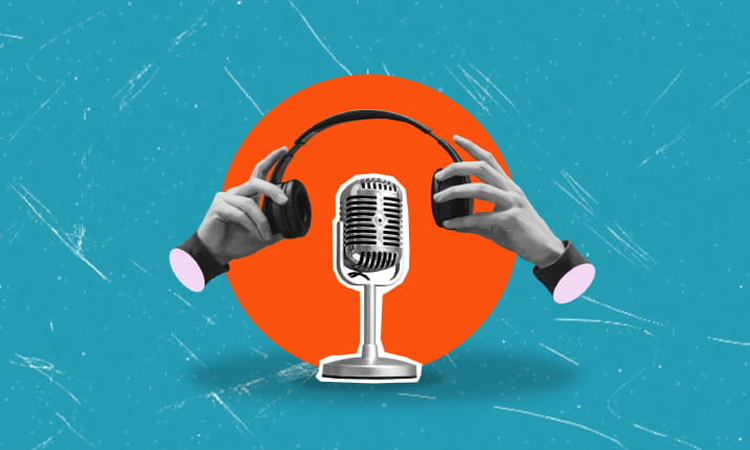
Voice Effect in podcasting refers to audio enhancements or modifications applied to a podcast during editing or recording. The main purpose of podcast voice effects is to add character to your podcast and enhance the listening experience for your audience. These voice effects can add personality, set the mood, or make a podcast sound more polished and professional. Content creators mainly use them for dramatic storytelling, comedic moments, or just cleaner audio, voice effects give podcasters powerful tools to enhance their listener's experience.
Why Use Voice Effect in a Podcast?
There are several reasons to use voice effects in Podcasts. Here are the top reasons to use voice effects in Podcasts:
- Storytelling & Atmosphere: Voice effects help set the tone and mood of a scene or story. Whether it's a spooky echo for a ghost story or a dreamy reverb for a flashback, effects make scenes more effective.
- Increase Engagement: Audio effects make a podcast more dynamic. They keep the listener entertained, especially in long episodes. Effects like robotic voices, echo, or layered vocals add fun or humor.
- Create a Professional Feel: Polished audio with appropriate effects gives your podcast a cinematic or radio-drama vibe. If it sounds professional, listeners will take the content seriously.
- Convey Emotion: Voice effects can emphasize emotions or psychological states without spelling them out. For example, a voice fading out might signal and suggest fear or tension.
- Smooth Transitions: Effect helps cue scene changes or segment transitions, acting like visual cuts in a video. This helps organize content and guide the listener through the flow.
Part 2: Popular Voice Effect for Podcasting
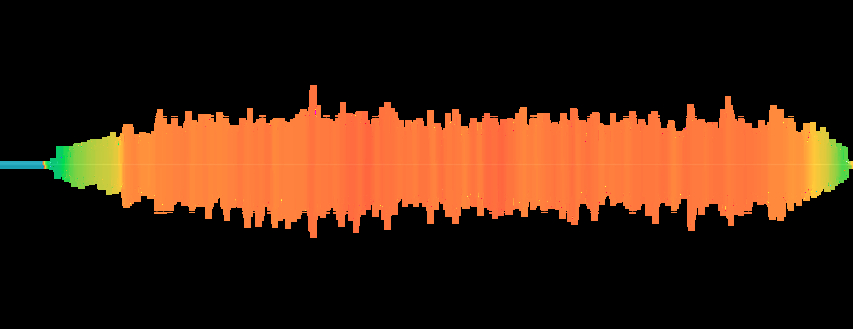
If you're looking for a popular voice effect for podcasts, you're in the right place. This section will introduce you to the popular podcast voice effects. With the help of these voice effects, you can create engaging podcasts for your audience.
- 1. Scary Voice Effect:One of the most used voice effects in podcasts is the scary voice effect. It adds a creepy, almost otherworldly sound to make the voice sound like it's coming from a haunted place.
- 2. Robotic Voice:A robotic voice often used for comedic effect. With the help of this voice effect, you can create funny moments for your podcast. Creators can also use funny voices like chipmunks, laughter, and more.
- 3. Whispery Voice:A very soft, breathy voice, often combined with a light echo or reverb to make it sound mysterious and close, as though someone is whispering directly into your ear.
- 4. Darth Vader Voice:A deep, breathy voice, similar to the voice of the famous Star Wars characters. It usually includes some mechanical or breathing sound effects to enhance the vibe of the podcast.
- 5. Zombie Voice:If you are a fan of podcasts, then you must have heard this voice effect. This is one of the most common voice effects used in podcasts. It has a slow, groaning voice with heavy distortion to make it sound like a zombie.
Part 3: Best Tool to Apply Voice Effect in Podcasts
As we all know, hundreds of online tools offer the best Podcast voice effects-but none stand out quite like HitPaw VoicePea. This powerful AI voice changer is one of the best in the game, offering a vast collection of voice effects designed to take your podcast to the next level. With HitPaw VoicePea, adding unique and engaging voice effects to your episodes is effortless, helping you captivate your audience with a dynamic range of voices.
The best part of this tool is that it offers various AI tools, each playing a different role in enhancing your audio content. The AI tools include Text-to-Speech, AI Voice Changer, AI Audio Enhancer, Online Audio Editor, and more. HitPaw also works as a real-time voice changer, allowing users to alter their voice in real time on platforms like Discord, Zoom, Twitch, Skype, and more. With this tool, users can convert their voices into celebrities, singers, politicians, and more.
Key Features of HitPaw VoicePea
- Hundreds of Voice Effects: HitPaw VoicePea offers a wide collection of voice effects, including monsters, aliens, zombies, funny, chipmunks, and more.
- Real-Time Voice Changer: This program allows users to alter their voices in real-time. It allows you to change voices on platforms like Discord, Zoom, Twitch, Skype, and more. HitPaw also offers various games such as Call of Duty, Fortnite, League of Legends, and PUBG.
- User-Friendly: Looking for a tool for beginners? HitPaw VoicePea has an intuitive interface, which is best for non-tech and beginner users. With this program, users can add voice effects to their podcast without any professional help.
- Noise Reduction: This feature is best for you if your podcast voiceover is noisy. It automatically analyzes the audio clip and eliminates noises from the recordings, providing a crisp and clear audio file.
- Compatibility: HitPaw VoicePea works seamlessly with various devices, including Android, iOS, Windows, and macOS. It also offers hundreds of PC programs, games, and web-based platforms.
- Format Supported: The program supports various audio formats, including MP3, WAV, and AAC, ensuring seamless compatibility with most audio editing tools and playback devices.
How to Add Voice Effects to Podcasts Using HitPaw VoicePea?
HitPaw VoicePea offers an intuitive interface, making the process simple. If you want to add voice effects to your podcast, then follow the below instructions to do it:
Step 1: Download and Install HitPaw VoicePea
Go to the HitPaw official site and download the program on your PC. Then, navigate to any third-party program and select "HitPaw Virtual Audio" as the input.
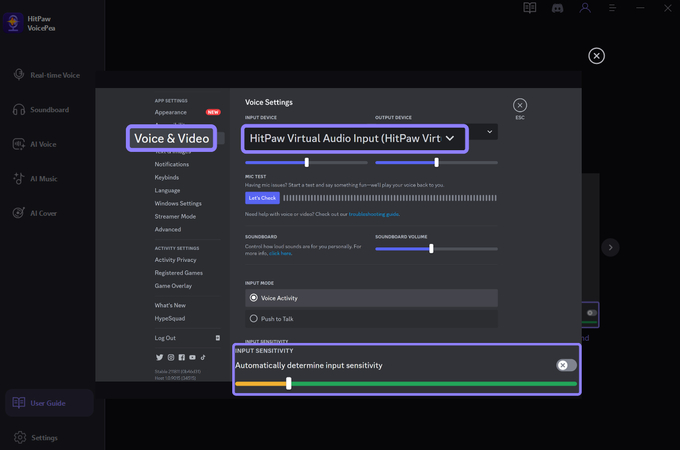
Step 2: Choose Preferred Sound Effect
Click the "Soundboard" option on the left and choose your preferred sound effect. HitPaw offers many voice effects, such as bobcat sounds, chip-chip, kitty, frog, and more.
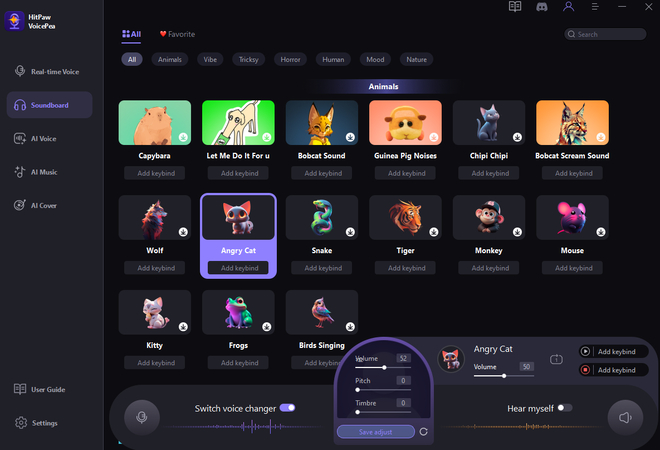
Step 3: Enable Hear Myself and Voice Changer
Next, enable "Hear Myself" and "Voice Changer" to preview the sound. If you are in a noisy environment, we recommend that you activate "Noise Reduction" to minimize background noise.
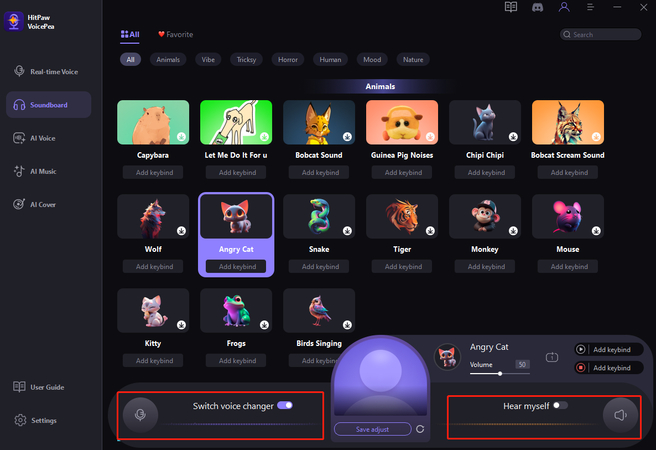
Step 4: Adjust Sound Settings
Now, adjust the sound settings to personalize your voice effect. Once you've completed the customization, the voice effect will be added to your recording in minutes.
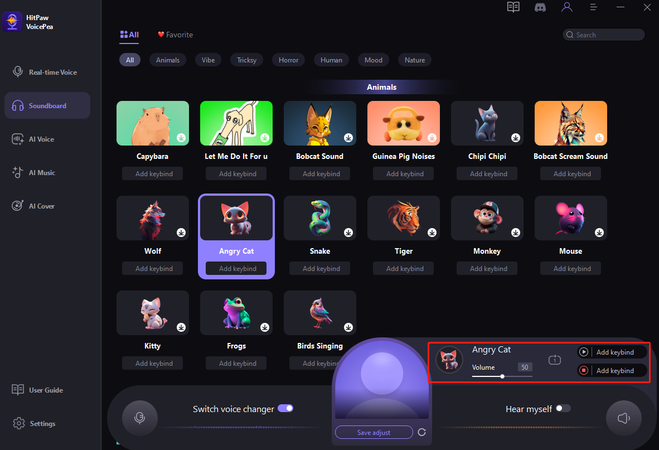
Part 4: Conclusion
If you want to enhance your podcast's overall quality, adding voice effects is a smart and effective move. Voice effects improve the clarity and tone of your audio and help set the mood, emphasize key moments, and keep your audience engaged. Above, we have mentioned the top Podcast voice effects and introduced you to the best AI tool to help you add voice effects to your podcast. The tool is known as HitPaw VoicePea.







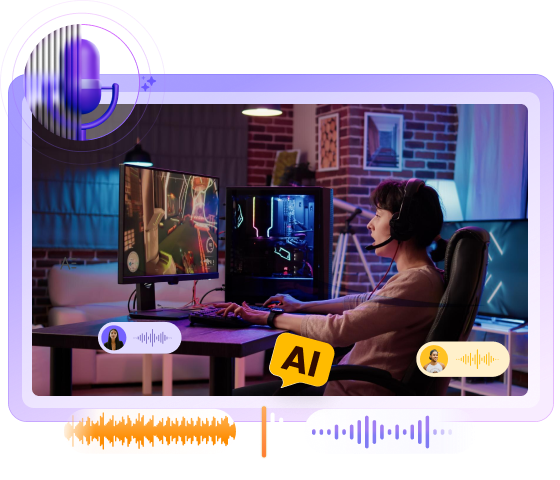
 HitPaw Univd (Video Converter)
HitPaw Univd (Video Converter) HitPaw VikPea (Video Enhancer)
HitPaw VikPea (Video Enhancer)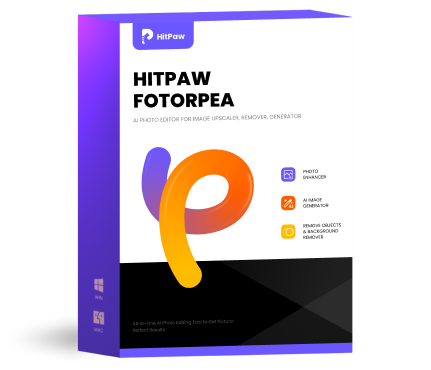 HitPaw FotorPea
HitPaw FotorPea
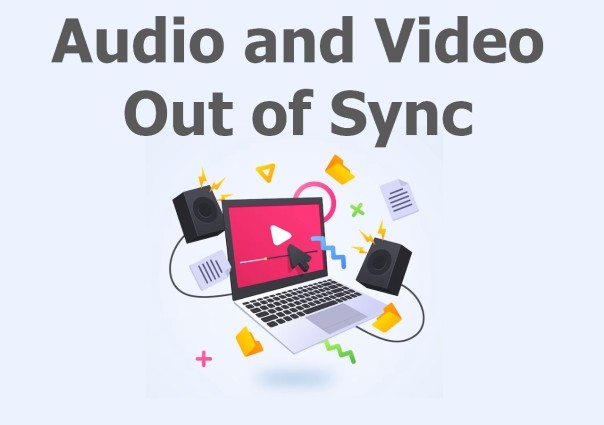
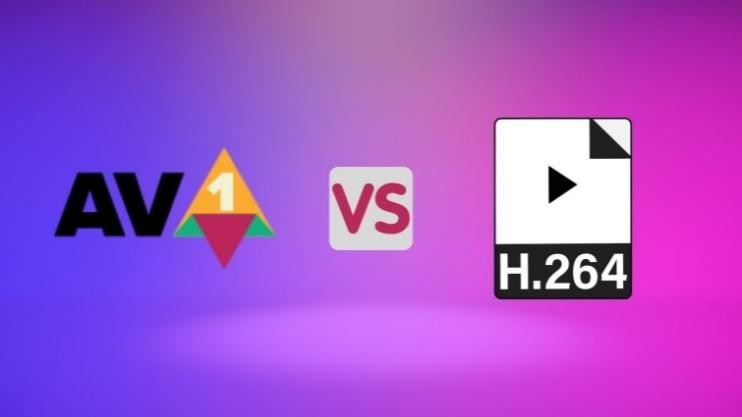


Share this article:
Select the product rating:
Daniel Walker
Editor-in-Chief
This post was written by Editor Daniel Walker whose passion lies in bridging the gap between cutting-edge technology and everyday creativity. The content he created inspires the audience to embrace digital tools confidently.
View all ArticlesLeave a Comment
Create your review for HitPaw articles